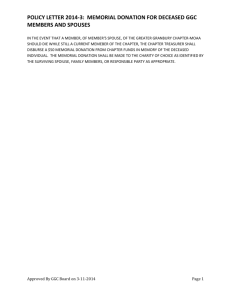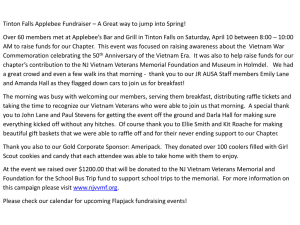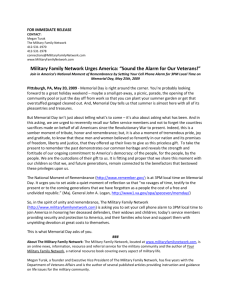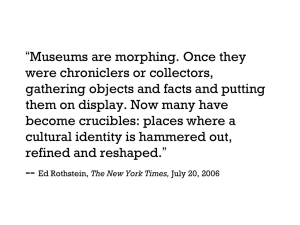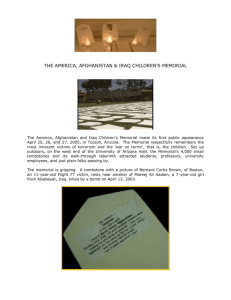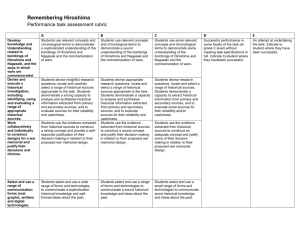Course Syllabus
advertisement
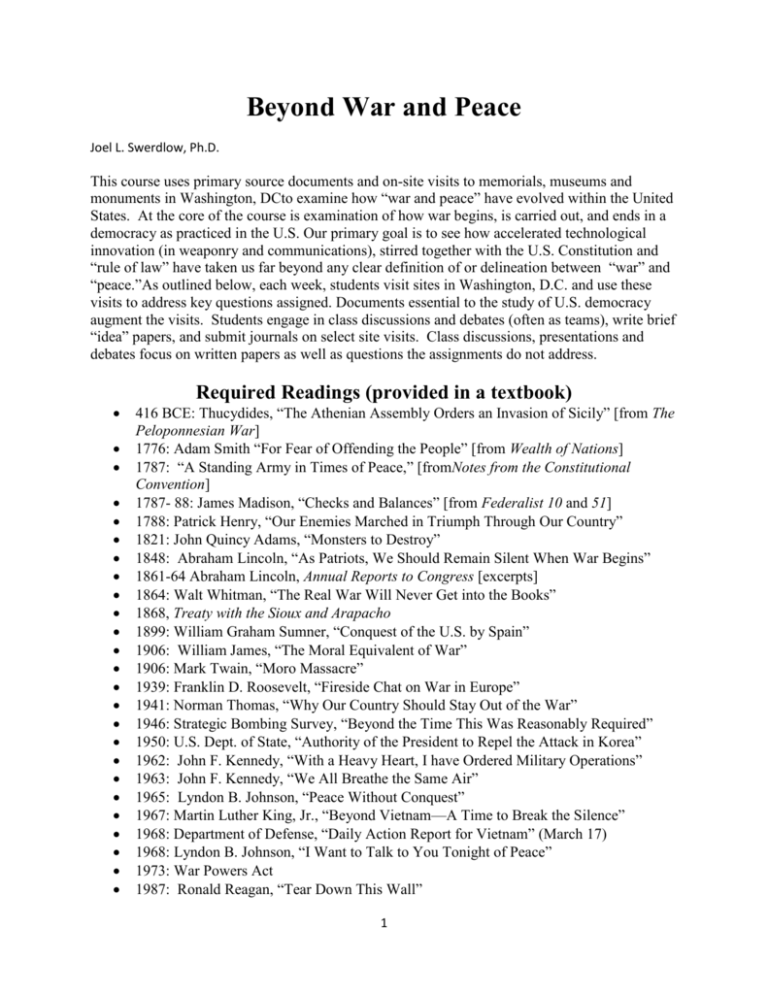
Beyond War and Peace Joel L. Swerdlow, Ph.D. This course uses primary source documents and on-site visits to memorials, museums and monuments in Washington, DCto examine how “war and peace” have evolved within the United States. At the core of the course is examination of how war begins, is carried out, and ends in a democracy as practiced in the U.S. Our primary goal is to see how accelerated technological innovation (in weaponry and communications), stirred together with the U.S. Constitution and “rule of law” have taken us far beyond any clear definition of or delineation between “war” and “peace.”As outlined below, each week, students visit sites in Washington, D.C. and use these visits to address key questions assigned. Documents essential to the study of U.S. democracy augment the visits. Students engage in class discussions and debates (often as teams), write brief “idea” papers, and submit journals on select site visits. Class discussions, presentations and debates focus on written papers as well as questions the assignments do not address. Required Readings (provided in a textbook) 416 BCE: Thucydides, “The Athenian Assembly Orders an Invasion of Sicily” [from The Peloponnesian War] 1776: Adam Smith “For Fear of Offending the People” [from Wealth of Nations] 1787: “A Standing Army in Times of Peace,” [fromNotes from the Constitutional Convention] 1787- 88: James Madison, “Checks and Balances” [from Federalist 10 and 51] 1788: Patrick Henry, “Our Enemies Marched in Triumph Through Our Country” 1821: John Quincy Adams, “Monsters to Destroy” 1848: Abraham Lincoln, “As Patriots, We Should Remain Silent When War Begins” 1861-64 Abraham Lincoln, Annual Reports to Congress [excerpts] 1864: Walt Whitman, “The Real War Will Never Get into the Books” 1868, Treaty with the Sioux and Arapacho 1899: William Graham Sumner, “Conquest of the U.S. by Spain” 1906: William James, “The Moral Equivalent of War” 1906: Mark Twain, “Moro Massacre” 1939: Franklin D. Roosevelt, “Fireside Chat on War in Europe” 1941: Norman Thomas, “Why Our Country Should Stay Out of the War” 1946: Strategic Bombing Survey, “Beyond the Time This Was Reasonably Required” 1950: U.S. Dept. of State, “Authority of the President to Repel the Attack in Korea” 1962: John F. Kennedy, “With a Heavy Heart, I have Ordered Military Operations” 1963: John F. Kennedy, “We All Breathe the Same Air” 1965: Lyndon B. Johnson, “Peace Without Conquest” 1967: Martin Luther King, Jr., “Beyond Vietnam—A Time to Break the Silence” 1968: Department of Defense, “Daily Action Report for Vietnam” (March 17) 1968: Lyndon B. Johnson, “I Want to Talk to You Tonight of Peace” 1973: War Powers Act 1987: Ronald Reagan, “Tear Down This Wall” 1 2001: “Use of Force” Resolution (September 14) 2002: “Authorization for use of Military Force Against Iraq” 2005: John Roberts, nominee to be Chief Justice of the U.S. Supreme Court [excerpt] 2007: George H.W. Bush on the 1991 Iraq War 2010: Barack Obama, “The Gratitude of an Entire Nation” Circa 2010 [undated]: U.S. Department of Justice, “Lawfulness of a Lethal Operation” Class Schedule Assignment before the first class: Visit the National Archives and see originals of the Magna Carta, Declaration of Independence, U.S. Constitution and Bill of Rights. WEEK ONE: Introduction Why did the Framers of the Constitution change “make war” to “declare war”? What role do checks and balances have in today’s wars? Are any worries from the Revolutionary War era newly-relevant today? What is the relationship between U.S. use (and threat)of force and our economic goals? Is war becoming less “kinetic”? Under what circumstances should the US government lie to the American people? Is it more acceptable to kill people we do not see? How do we measure suffering and justice, and when do the ends justify the means? How strong is the need not to know? Assignment for Week Two: Visit the National Museum of American History, Iwo Jima Statue and site of the future Dwight D. Eisenhower Memorial--and address assigned questions. WEEK TWO: Politics, Taxes--and War Should we have a military draft? Should we worry about a military-national security-industrial-political complex? To what degree do leaders of both major political parties discuss “peace” when they mean “war?” To what degree does the modern U.S. economy depend upon military spending for technological innovation and growth? How does the U.S. pay for wars? Assignment for Week Three: Visit the D.C. World War I Memorial (1932), the Tomb of the Unknowns (1922), and the Tomb of Unidentified Civil War Dead (1866), and address assigned questions. WEEK THREE: War and Democracy What stories should upcoming media attention to the 100th anniversary of World War I emphasize? 2 To what degree is it true (and useful) that democracies rarely fight each other in a war? What impact has the fixed calendar dates of U.S. elections had on our war-making? Assignment for Week Four:Visit World War II Memorial (2004); FDR Memorial (1995); and Japanese Interment Memorial (1988) and address assigned questions. WEEK FOUR: Stories and Analogies from America’s Last “Good” War Why do people now say WWII was a “good” war? What is “thinking in time” and why is the Munich analogy still so powerful? Why is what FDR did in Greenland and Iceland important today? Assignment for Week Five: Visit the Korean War Memorial (1995) and Vietnam Veterans Memorial and address assigned questions. WEEKS FIVE &SIX:An Era of Undeclared, Unpopular Wars How many more wars will this era bring? How does America end wars? Who shapes and controls narratives about “who won and why?” What kind of Memorial will be built to the war in Iraq? Assignment Week Seven:Visit the Air & Space Museumand address assigned questions. WEEK SEVEN: The Future of Machine v. Man Can “strategic bombing” during WWII teach us anything about drones? Does fighting from a safe distance change behavior or morality? Assignment for Week Eight: Visit the Martin Luther King, Jr. Memorial (2011) and the U.S. Institute for Peace Institute (new building dedicated in 2005) and address assigned questions. WEEK EIGHT: Peace Have we entered an era of permanent “war” (or has one always existed)? What new tools and potential for peace does technology create? Do economic ties and mutually beneficial relationshipslessen the likelihood of war? Assignment for Week Nine: Visit the Newseum and address assigned questions. WEEK NINE: 24/7 News and Social Media To what degree are 24/7 news and social media changing our notions and expectations about war and peace? Why is it a truism that “the first casualty of war is truth”? Was Dwight D. Eisenhower correct when he said, shortly before the D-Day landings, “Public opinion wins wars?” 3 How has photography (still and video) changed our relationship with war; what will happen as digital, mobile networks become more available? WEEK TEN: CONCLUSION 4
